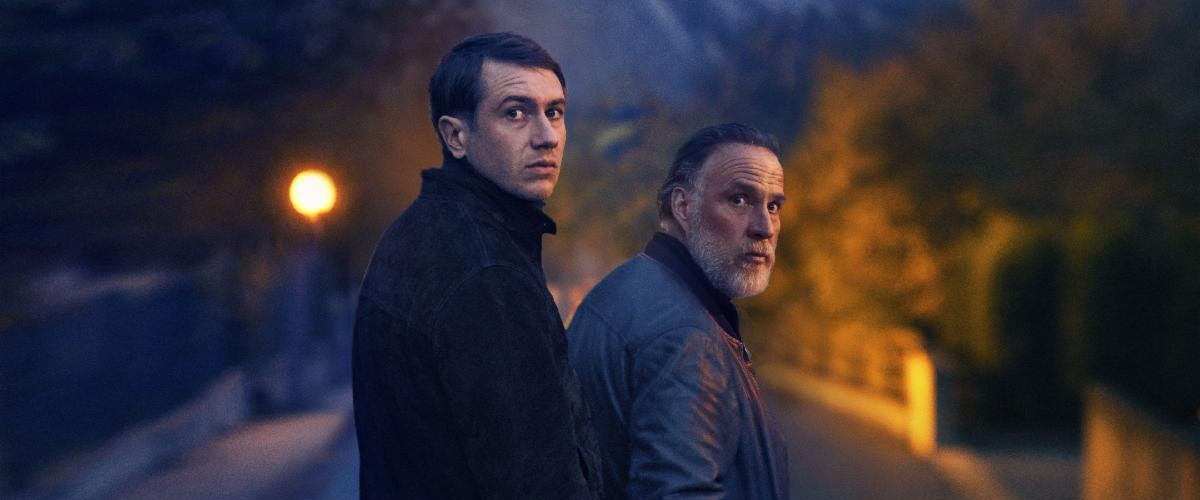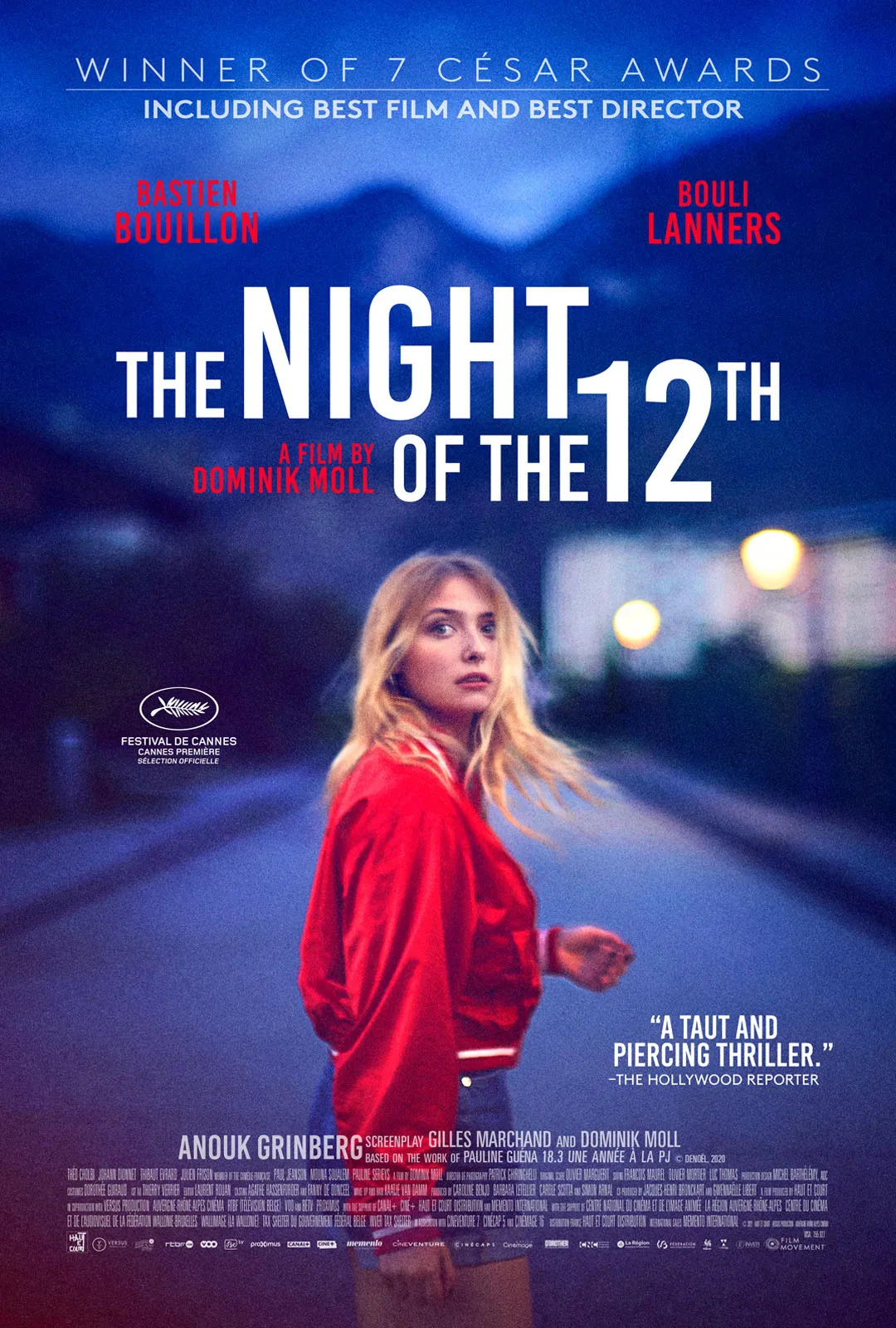At first glance, Dominik Moll’s “The Night of the 12th” is a fairly routine albeit extremely well-crafted police procedural. There’s a horrifying murder, a baffled police force, multiple potential suspects. It’s loosely based on a real unsolved case, detailed in Pauline Guéna’s book 18.3 – A Year With the Crime Squad. But there’s more going on here than meets the eye. “The Night of the 12th” runs deep. The film’s effectiveness lies in its matter-of-fact surface and its roiling wordless interior, the stealthy way it makes its points (without announcing “This is The Point”).
Yohan Vivès (Bastien Bouillon), unit chief in the Grenoble police department, is new to the job when a harrowing case comes in. A young, vivacious woman named Clara (Lula Cotton-Frapier) walks home from a party. As she strolls through the dark empty streets, she makes a giggly video for a friend, blowing kisses. A figure emerges from the shadows, says her name, douses her with liquid, and then sets her on fire. Clara’s half-charred body is discovered the following morning, curled up in the grass. Yohan and his veteran partner Marceau (Bouli Lanners) head up the investigation.
The cops suffer not from a paucity of leads, but too many leads. Clara had an active social life, and each man is sketchier than the one before. Clara liked “bad boys,” apparently. Each man is a plausible suspect. One wrote an angry rap song about setting her on fire. One bursts out laughing when he talks about how she died. One has a history of domestic violence. These men are tantalizing as suspects but lead the detectives down a maze of blind alleys. The deeper they go into her life, the more mysterious the case becomes.
“The Night of the 12th,” is one of those stories about an unsolved murder (the opening credits state this outright), the cases that haunt the detectives who worked them, and the murderer that got away. The gold standard of these stories is Bong Joon-ho’s “Memories of Murder,” with David Fincher’s “Zodiac” close behind. These films are frank in their interest in monomaniacal obsession, in their portraits of men driven to devote their lives to a lost cause and, in many cases, to trash their lives in the single-minded pursuit of truth. Nothing can top the final shot of “Memories of Murder” for expressing this idea. “The Night of the 12th” does not run as high a fever as “Memories of Murder” and “Zodiac”: its mood is chillier, its atmosphere bleak. The matter-of-fact-ness of the detectives working the case provides the grim backdrop. There’s despair present as well, but it’s a low-humming buzz rather than a shrieking opera.
Very early on, it’s impossible to ignore the fact that a young woman has been murdered and the entire police force is male. These are professional men who do their job and do it very well, but at a certain level, there is a disconnect. The men slip into moments of judging Clara for her risky behavior. They don’t call her a “slut” or anything, but the implication is clear. Yohan tries to course-correct these conversations, but he doesn’t have the language to express the imbalance at work. Maybe somewhere, he, too, is judging Clara; maybe he wishes she was a “perfect victim.” It is up to Stéphanie (Pauline Serieys), Clara’s heartbroken best friend, to finally tell Yohan about the blind spots at work, blind spots he didn’t even know he had.
This is where “The Night of the 12th” works. When a female judge asks for the case to be re-opened three years later and calls Yohan in to discuss, he says, confusedly, “Something is amiss between men and women.” Such a simple word but so eloquent. He knows what’s wrong. He can see it in front of him! He just isn’t sure how it might apply. The screenplay is excellent (the film won six Césars earlier this year, including Best Adapted Screenplay, Best Director, and Best Film). When the script is “on the nose,” as it is in the excellent scene between Stéphanie and Yohan, it can afford to be.
“The Night of the 12th” contains a pretty hefty critique of systemic issues, not just issues with systems but with people and how they think. The film’s critique is devastating since so little of it makes it into the language. The characters don’t have the language to address what is really going on, and if you don’t have the language, then you don’t have the thoughts and feelings either. In 1984, George Orwell laid out this concept for all time: “Every year fewer and fewer words, and the range of consciousness always a little smaller.”
The case reveals cracks in the lives of the men working to solve it. Marceau’s marriage is busting up, and he is sick of being a cop. He never really wanted to be a cop anyway. Yohan lives an ascetic disciplined life without any apparent personal or romantic interests. Every night he rides his bike around a track. He pedals furiously but doesn’t really get anywhere. The metaphor is a bit obvious, but it draws us into the character’s involvement. The men working on Clara’s case want to solve it. They work round the clock. But “something is amiss,” all right. That it takes Yohan so long to speak those words out loud—and that when he does so, it is to a woman he just met and not his male colleagues—isn’t part of the problem. It is the problem.
Now playing in theaters.




















